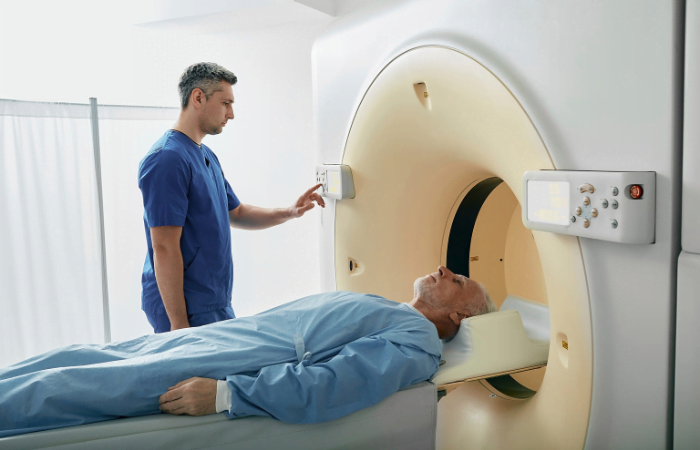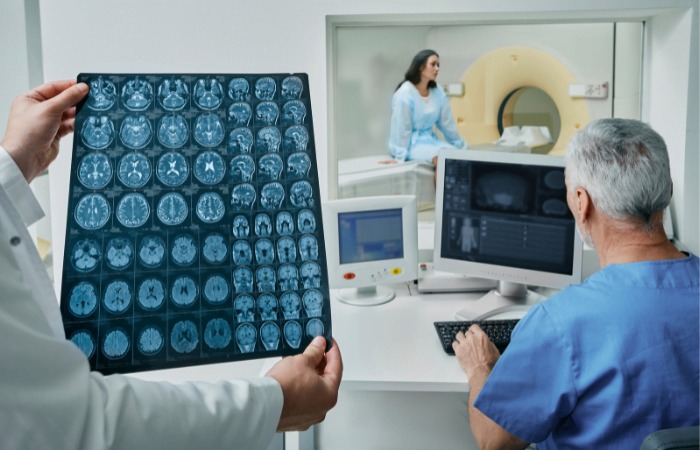
CT scans (Computed Tomography scans) are one of the most effective diagnostic tools used by healthcare providers to get detailed images of the inside of the body. Whether it's detecting tumors, assessing internal injuries, or evaluating organs, the CT scan procedure provides doctors with the insight they need to diagnose and treat various conditions accurately.
If you're scheduled for a CT scan, you may have some questions about what happens during the procedure. Understanding the step-by-step process of a CT scan can help alleviate any concerns and ensure you're well-prepared. In this blog, we’ll walk you through the CT scan procedure, highlighting what you can expect before, during, and after the scan. We will also discuss how Diagnopein offers affordable CT scan services in cities like Pune, Delhi, Mumbai, Nagpur, Bhopal, and Ahmednagar.
A CT scan uses a series of X-ray images taken from different angles and then combines them to create cross-sectional images of your bones, organs, and tissues. These detailed images help doctors assess internal injuries, diagnose diseases such as cancer, monitor the effectiveness of treatments, and much more. Unlike regular X-rays, a CT scan provides much more detailed images, making it a vital tool for accurate diagnoses.
A CT scan may be recommended by your healthcare provider to diagnose various medical conditions. Some common reasons for getting a CT scan include:
1. Evaluating injuries: After an accident or trauma, a CT scan can provide detailed images of internal injuries, including fractures, bleeding, and organ damage.
2. Diagnosing cancer: Doctors use CT scans to locate tumors and assess their size, shape, and potential spread.
3. Detecting infections or inflammation: A CT scan helps identify infections, inflammation, or abscesses within the body.
4. Monitoring treatment: For conditions like cancer, CT scans are used to monitor the effectiveness of treatment and see if a tumor has shrunk or grown.
5. Evaluating organs: A CT scan is often used to examine vital organs such as the brain, heart, lungs, and liver.
Here’s what you can expect during a CT scan:
1. Preparation for the CT Scan: The preparation required for a CT scan can vary depending on the area being scanned and the type of scan. Here’s what to expect:
Clothing and Accessories: You will be asked to remove any clothing that might interfere with the scan. This usually includes jewelry, metal objects, or any items that contain metal. You may be given a hospital gown to wear during the procedure.
Contrast Dye: Depending on the type of CT scan, you might need to take contrast dye (also called contrast material or contrast agent). This is typically administered through an intravenous (IV) line or may be ingested or injected, depending on the type of scan. The dye helps make certain areas of the body more visible on the scan. It may cause a warm sensation, but this is normal and temporary.
Dietary Restrictions: If you are having an abdominal or pelvic CT scan, you might be instructed to avoid eating or drinking for a few hours before the procedure.
2. During the CT Scan: Once you’re prepared, the CT scan procedure will begin. The process is quick and painless, though it may take 10-30 minutes, depending on the type of scan.
Positioning: You will be asked to lie down on a narrow, flat table. For certain scans, you may need to lie in specific positions to ensure accurate imaging. Depending on the area being scanned, you might need to lie on your back, side, or stomach.
The CT Scanner: The CT scanner is a large, doughnut-shaped machine with a moving table. The machine will rotate around you as it takes detailed images of your body. You may hear some buzzing or whirring sounds during the scan, but this is normal.
Breathing Instructions: During the scan, you may be asked to hold your breath for a few seconds. This is to minimize any movement that could interfere with the images.
No Pain: The CT scan itself is painless, but the contrast dye may cause some temporary discomfort, such as a warm feeling or a metallic taste in your mouth (if ingested).
3. After the CT Scan: Once the CT scan is completed, you can resume your normal activities. If you received contrast dye during the scan, you may be monitored for a short time to ensure there are no adverse reactions.
Drinking Fluids: If you have contrast dye, it’s essential to drink plenty of fluids afterward to help flush it out of your system.
Results: The results of your CT scan will be analyzed by a radiologist, and your healthcare provider will discuss the findings with you. In some cases, the results may be available within a few hours, but more complex cases may take a few days to process.

Detailed Images: The most significant advantage of a CT scan is its ability to provide highly detailed cross-sectional images, which are crucial for diagnosing a wide range of conditions.
Speed and Efficiency: CT scans are fast and can provide results quickly, which is especially important in emergencies where time is critical.
Non-invasive: Unlike surgical procedures, a CT scan is non-invasive and does not require incisions, making it a safer option for many patients.
Head CT Scan: Used to evaluate the brain for conditions like stroke, trauma, or tumors.
Chest CT Scan: Helps detect lung diseases, such as pneumonia, cancer, or pulmonary embolism.
Abdominal CT Scan: Used to examine the organs in the abdomen, including the liver, kidneys, pancreas, and intestines.
Pelvic CT Scan: Assesses the pelvic organs, including the bladder, uterus, ovaries, and prostate.
At Diagnopein, we understand that medical costs can be a concern for many patients. That’s why we offer affordable CT scan services at our diagnostic centers in Pune, Mumbai, Delhi, Nagpur, Bhopal, and Ahmednagar. Our rates are competitive, ensuring that you receive the highest quality care without breaking the bank.
A CT Scan is a powerful and non-invasive diagnostic tool that helps doctors evaluate various medical conditions with accuracy and efficiency. From assessing internal injuries to diagnosing cancer and monitoring treatment progress, CT scans provide essential insights that guide effective treatment plans.
If you're looking for affordable CT scan services, we offer competitive prices in multiple cities. Book your CT scan today and take the first step toward better health.